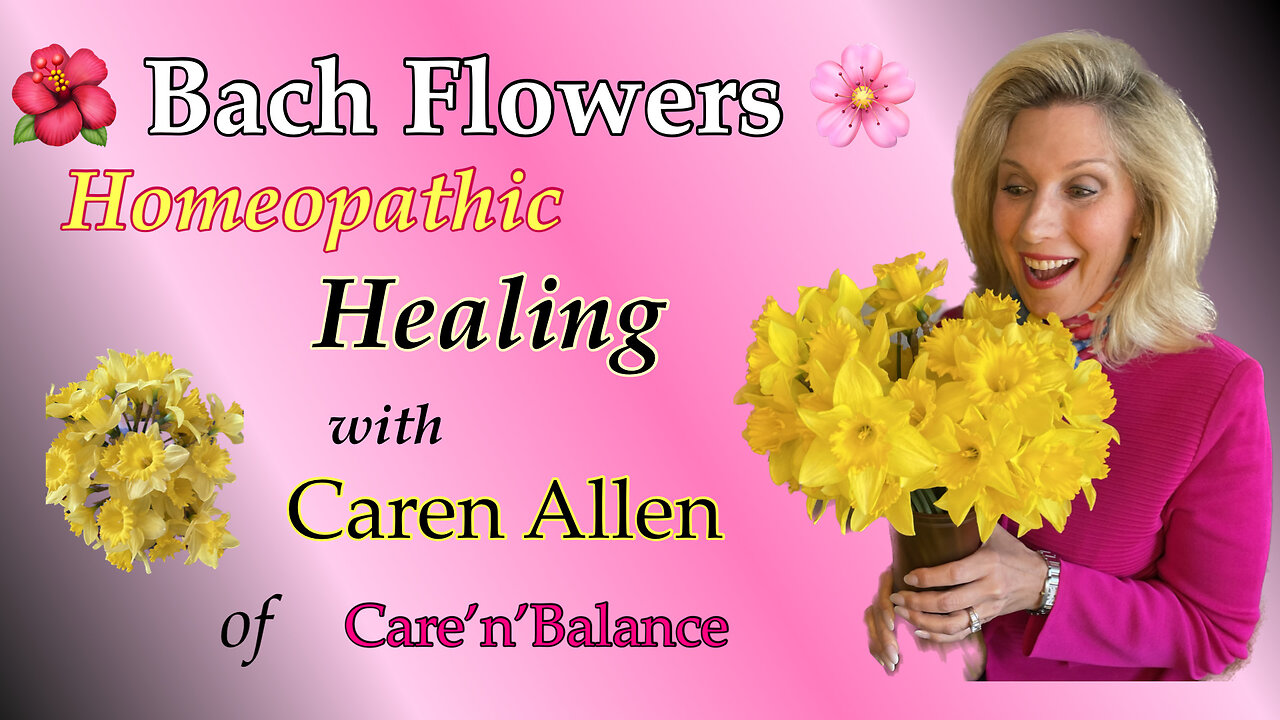Premium Only Content

Dew Drops on 🌺 Flower Petals 🌸 & Healing?! TUNE IN!!! The Bach Flower Remedies & How They Work
Homeopathic British physician Dr. Edward Bach made some fascinating discoveries about the healing vibrations of captured dew drops on flower petals. These findings have survived for nearly a century and are STILL available as remedies for emotional pain and anxiety. Our fabulous Guest, certified Nutritional Health Professional and certified Functional Nutritional Therapy Practitioner and Manager of Health Plus Natural Foods in Sandusky, Ohio, Caren Allen leads our fascinating conversation about Bach Flower Remedies, Caren, founder of Care'n'Balance, utilizes Bach Flowers as one tool in her tool kit as she works with clients to optimize their mental, physical, and emotional health. Caren's website is: https://www.carenbalance.com and you can reach her by email at caren@carenbalance.com.
https://lifebyrandi.com
More about Caren Allen: https://www.facebook.com/CarenBalance https://healthplusnaturalfoods.com https://healthplusnaturalfoods.com/about/ Bach Flowers https://www.bachremedies.com/en-us/range/
Who is Dr. Bach?
Dr. Bach was a physician and homeopath in England in the early 1900’s who believed that the attitude of the mind played a vital role in maintaining health and recovering from illness. He treated his patients as individuals rather than cases and observed that their personalities and attitudes were more important than symptoms when considering medical treatment. Dr. Bach’s philosophy was based on the innate perfection and spiritual nature of human beings, and that health and happiness result from being in harmony with our own nature and doing the work for which we are individually suited. He believed that “disease is entirely the result of a conflict between our spiritual and mortal selves” and “is the reaction to interferences. This is a temporary failure and unhappiness, and this occurs when we allow others to interfere with our purpose in life and implant in our minds doubt, fear, or indifference”.
What are Flower Essences?
They are made from a dewdrop, heated by the sun that has acquired the healing properties of the plant it lays on. Dr. Bach discovered 38 healing essences each for a specific emotional and mental state, plus a combination of five of the essences designed for difficult and demanding situations, which he called Rescue Remedy. The 38 essences cover all aspects of human nature and thus all the negative states of mind that underlie illness, such as fear, uncertainty, indifference, loneliness, over-sensitivity to influences and ideas, despondency or despair, and over-concern for others’ welfare. In addressing these fundamental conflicts of self, one can return to a state of peace, hope, joy, faith, certainty, wisdom, and love.
https://www.bachcentre.com/en/remedies/the-38-remedies/quick-reference-guide/ :
Remedies
Agrimony – mental torture behind a cheerful face Aspen – fear of unknown things
Beech – intolerance Centaury – the inability to say ‘no’
Cerato – lack of trust in one’s own decisions
Cherry Plum – fear of the mind giving way
Chestnut Bud – failure to learn from mistakes
Chicory – selfish, possessive love
Clematis – dreaming of the future without working in the present
Crab Apple – the cleansing remedy, also for not liking something about ourselves
Elm – overwhelmed by responsibility Gentian – discouragement after a setback
Gorse – hopelessness and despair
Heather – talkative self-concern and being self-centred
Holly – hatred, envy and jealousy Honeysuckle – living in the past Hornbeam – tiredness at the thought of doing something
Impatiens – impatience
Larch – lack of confidence
Mimulus – fear of known things
Mustard – deep gloom for no reason
Oak – the plodder who keeps going past the point of exhaustion
Olive – exhaustion following mental or physical effort Pine – guilt
Red Chestnut – over-concern for the welfare of loved ones
Rock Rose – terror and fright Rock Water – self-denial, rigidity and self-repression
Scleranthus – inability to choose between alternatives
Star of Bethlehem – shock
Sweet Chestnut – extreme mental anguish, when everything has been tried and there is no light left
Vervain – over-enthusiasm
Vine – dominance and inflexibility
Walnut – protection from change and unwanted influences
Water Violet – quiet self-reliance leading to isolation
White Chestnut – unwanted thoughts and mental arguments
Wild Oat – uncertainty over one’s direction in life
Wild Rose – drifting, resignation, apathy
Willow – self-pity and resentment
-
 1:04:58
1:04:58
In The Litter Box w/ Jewels & Catturd
1 day agoNo Tax On Tips! | In the Litter Box w/ Jewels & Catturd – Ep. 722 – 1/17/2025
85.6K23 -
 5:35:39
5:35:39
Dr Disrespect
8 hours ago🔴LIVE - DR DISRESPECT - WARZONE - CRAZY CHALLENGES
127K27 -
 LIVE
LIVE
LFA TV
7 hours agoBanning Mystery of the Ages | TRUMPET DAILY 1.17.25 7pm
292 watching -
 LIVE
LIVE
2 MIKES LIVE
1 hour ago2 MIKES LIVE #168 Open Mike Friday!
128 watching -
 LIVE
LIVE
Sarah Westall
2 hours agoMysterious Fog and California Wildfires Both Contain Dangerous Elements w/ Dr Robert Young & Hazen
443 watching -
 LIVE
LIVE
Mally_Mouse
1 hour agoLet's Play!! -- Stardew Valley pt. 23!
210 watching -
 16:21
16:21
China Uncensored
4 hours agoCan Anything Stop the Tiktok Ban?
18.4K5 -
 7:08
7:08
Guns & Gadgets 2nd Amendment News
9 hours agoTruckers Fight For National Reciprocity
13.1K7 -
 1:30:22
1:30:22
InfiniteWaters(DivingDeep)
10 hours ago7 MOST USEFUL MANIFESTATION LIFE HACKS EVER!
3.02K1 -
 47:17
47:17
PMG
2 hours ago $0.02 earnedHannah Faulkner and Julie Behling | Beneath Sheep's Clothing
1.42K